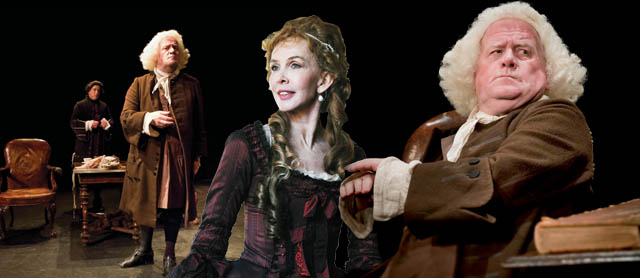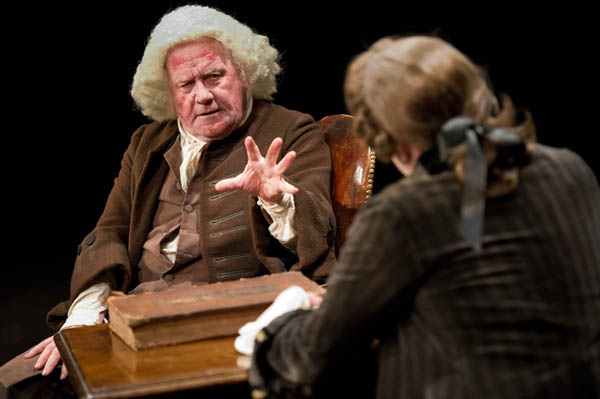Last night I went to see ‘A Dish of Tea with Dr Johnson’, a two man and one woman show that uses material from Boswell’s Johnson writings (and a tiny snippet from his London journal).
For those expecting action, they would have been disappointed because A Dish of Tea is not really a play, it’s ‘An Audience With...’ There are no real dramatised scenes, just lots of fascinating people telling their stories in character. This is a good thing. It focusses the attention onto the people on the stage, what they are saying and how they are saying it. Although it could be regarded a dramatic failure, in terms of involvement of the audience into the characters on stage it is highly successful.
Unfortunately, co-creator and player of many parts Russell Barr is ‘seriously ill’ and his part was taken by Luke Griffin. The play is very word heavy and the part not only includes Boswell, but also Goldsmith, Lady Flora MacDonald and a whole host of other characters. This meant that the night didn’t have the snap that it could have, the ebb and flow of two actors fully comfortable in roles they have been playing pretty constantly since 2009. It also meant that Kate, Barr’s dog who usually played Hodge, Johnson’s cat, was unable to appear. Instead they mimed the cat. This sadly means I can’t do the jibe about a dog playing a cat is ‘not done well, but surprised to see it done at all’.
Luke Griffin did well as last minute replacement, giving a range of different characters, adopting different mannerism and accents for each one and doing his very best to spar with Johnson and feed him for his best lines. His Boswell was the right mixture of cocky, weeningly flattering and deep down miserable, conveying Boswell’s shifts between pride and self hatred well. His female characters were not so on the nail, his Mrs Williams lacked the factor of intimidation that all the characters attributed to her, though his Flora MacDonald delivered some very funny lines with understated grace. There was also the benefit that Griffin is (or appears) younger than Barr and so provides a starker vision of the age gap between he and Redford’s Johnson.
As for the other members of Johnson’s friends (also played by Griffin); poor Joshua Reynold’s got to be the butt of most of the ‘fool’ gags, made to look little more than a simpleton. David Garrick was much discussed but not represented (indeed, it was amusing on the way out to hear two people talking about how they had never heard of Garrick when they were a spits distance from Garrick Street, the Garrick Bar and the Garrick Theatre). Goldsmith got off pretty well considering his representation in Boswell’s writings. To be sure, Griffin is from Ireland and seemed comfortable in the character, twisting his face to give that over-arching top lip that characterises Goldy’s face. I also found it gratifying that my pal Nolly, in the 3 minute segment devoted to him, managed to get a number of really good laughs.
What I did miss though, was a dramatisation of the short conversation when Goldsmith and Johnson about fables and fairy tales, where Goldsmith is saying how hard they are to write and Johnson arguing how easy. Goldsmith tells Johnson they are hard because you have to accurately present the characters of the animals, the tortoises have to read like tortoises and the little fishes like little fishes; when Johnson says that he could do it easily, Goldsmith replies that Johnson would make the little fishes sound like whales. I’d have liked that, just to see the look on Johnson’s face.
One of the things I loved most about the performance was the confidence it had in presenting Johnson and his friends, enemies and acquaintances. There was little or no introduction, the audience were supposed to understand who was who (and what baggage they had brought with them) straightaway. This made it very enjoyable for me, as the show didn’t get bogged down in all that elementary stuff but was done in a way that must have been clear to Johnson neophytes as when I was leaving, nobody was complaining about not being able to follow it but were instead exalting in all the new and interesting people they could now get to know.
The only character other than Johnson who was not played by Luke Griffin was Hester Thrale, a part originally played in 2009 by Barr, but has for some time been played by Trudie Styler (who I discovered was Sting’s second wife, the wonders of research eh?). This is very much a performance of Boswell’s life of Johnson, and Mrs Thrale is not presented with much sympathy at all. She is sharp but flighty, teasing the doctor and flirting with him, even (controversially) allowing him a kiss and then skipping off giggling at her own naughtiness while Johnson dies inside. This is Boswell’s, Yoko Ono version of Hester and he gets to have the last word, calling her a ‘little, artful, impudent, malignant, devil’. I read a review where her introduction was disliked but I found the entrance in the last ten minutes of a beautiful, though very odd looking woman in a rustling red dress to be a real invigorator. (Also due to research, I have learnt the thing that I found so unsettling about her was the superabundant use of botox).
Finally there was the character of Samuel Johnson himself. There was a moment of confusion when Samuel Johnson started to speak, over half the audience wondered why this man, second only to Shakespeare in OED’s list of quotations was speaking in a thick Midlands accent. This is not the first time in the night that the audience are confronted with elements of Johnson that have largely been removed from the public consciousness of him. That accent is used with great effect, giving Johnson that air of grounded genius.
Redford makes a tremendous Johnson; coarsely humourous and eruditely witty, able to pull off the ‘tempests and gales’ of anger and frustration but also the slightly pathetic need for company and distraction, full of wisdom but also full of sadness.
Be warned! This is definitely Boswell’s Johnson we are meeting. For example, there is liberal use of Johnson’s wife gags and some of his rather less enlightened conversations with Mrs Thrale about the role of women, but no mention of his enthusiastic support for women of letters; mention of the time spent chatting with women, his interest in trying to get inside the role of woman to see how it fit (a role he professed to envy at times). This is Boswell’s Johnson, masculine and direct. However, Boswell’s Johnson is the Johnson we most often see and he is presented with a great amount of verve and humanity. It is hard to take your eyes aways from him, always moving, playing with his hands, rocking slightly, and with a good line in his mouth. This Johnson knows how to enjoy an audience and make an audience enjoy him, yet we don’t forget the desperate need for company and distraction behind that enjoyment.
A perfect representation of Johnson is impossible though, and for Redford the main barrier to him being a perfect Johnson is the obvious love and respect the actor has for the man. In the programme, he thanks member of his family for ‘putting up with his obsession’, and it clearly is an obsession. If anything shows more clearly, it is Redford’s love for Samuel Johnson, both as a legend and as a man and this gets in the way of his portrayal, because although Johnson said he was ‘willing to love all mankind, except an American’ there is one man Johnson clearly did not love, and that was himself.
I will have to one day come to terms with the fact that I will never be able to sit and listen to Johnson’s conversation, nor have him savage me in conversation or slurp tea in my face. I am also now resigned to the fact that no actor will ever be able to fully conjure up the Samuel Johnson that lives in my head, but in ‘A dish of tea with Dr Johnson’, Ian Redford has come the closest so far.
Yours





No comments:
Post a Comment